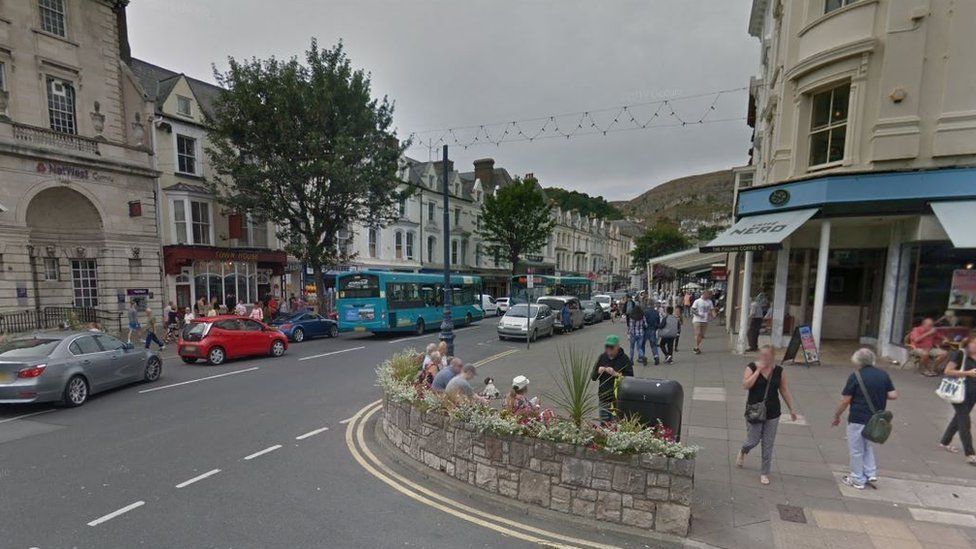

Conwy council tracks people's phones to monitor footfall
source link: https://www.bbc.com/news/uk-wales-63907208
Go to the source link to view the article. You can view the picture content, updated content and better typesetting reading experience. If the link is broken, please click the button below to view the snapshot at that time.

Conwy council tracks people's phones to monitor footfall

A council is using people's mobile phone movements to get an insight into shoppers' habits on high streets.
Conwy council's pilot tracks people who use its free wi-fi services as they move around Llandudno's Mostyn Street.
The information will inform decisions around business hours and where further investment might be needed.
But the issue has sparked fierce debate, with Llandudno councillor Harry Saville raising concerns about how the project may affect people's privacy.
The council already has a system whereby, with their consent, the council collects data from wi-fi-users at its offices, buildings, libraries and leisure centres and uses it for marketing purposes, such as promoting events.
Now, as part of this new scheme in partnership with the Welsh government, the council is able to track wi-fi-users' mobile phones in Mostyn Street by triggering sensors.
The data collected contains no personal information, but gives the council a picture of movements around the street by tracking a device's media access control (Mac) address.
Discussing the matter at a scrutiny committee meeting, Mr Saville questioned whether people's personal information was at risk from the scheme.
"I appreciate you are not capturing any personal data, but if we think, smartphones, and most people will only have one, the Mac address, the identifier in many cases, is unique," he said.
"So let's say I go down Mostyn Street, you are not able to tell who I am personally, my age, my other details, but you know where my phone has been, and someone would be able to link that to an individual wouldn't they, potentially?"
Conwy council IT manager Neil Payne replied: "Potentially, yes, if we had details of your phone contracts, which we don't have, or if you went to the mobile phone providers."
But he added: "The initial purpose of it is to monitor footfall. So all it does is picks up what we call a Mac address, a unique address, no personal details at all, and it just tracks the movement of those phones."
Kinmel Bay councillor Nigel Smith dismissed Mr Saville's arguments as "scaremongering".
"I couldn't find out what councillor Harry's Mac address is if I wanted to," Mr Smith said.
"That's the truth of the matter. I could quite easily go out and look at a registration on a car and monitor where that car goes, and nobody worries about that."
The committee voted against Mr Saville's proposal to stop the pilot.
Recommend
-
 8
8
Show Search
-
 13
13
Friday, 15 January 2021 10:12 Pauline Hanson's website redirected to refugee council site Featured By Sam Var...
-
 7
7
$140 Billion Bitcoin Not Moved in Years, “Lost” Says National Cyber Security Council – TrustnodesMore than four million bitcoin, worth $140 billion, has not moved in the past five years according to blockchain data. There remain alm...
-
 8
8
Footfall's coming home as Christmas shopping in the Vaccine Economy shapes up to be rather different
-
 8
8
Leicester City Council launch app to help people explore city historyPublished18 hours agoImage source, Hawkins family
-
 3
3
EYE IN THE SKY — FTC sues data broker that tracks locations of 125M phones per month Agency says data shows users visits to clinics and homeless shelters....
-
 5
5
Conwy councillor denies voting on Zoom while drivingPublished22 hours ago
-
 9
9
February 16, 2023 ...
-
 6
6
US Markets Loading... In the news ...
-
 8
8
Gene J. Puskar via Associated Press‘32 Nasty:’ Rail Workers Say They Knew the Train That Derailed in East Palestine Was DangerousA freight train carrying toxic chemicals derailed 50 miles outside Pit...
About Joyk
Aggregate valuable and interesting links.
Joyk means Joy of geeK